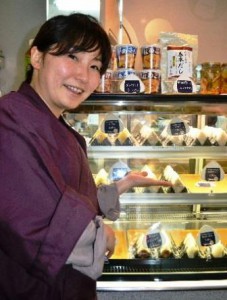ZEN-NOH (National Federation of Agricultural Cooperative Associations), agricultural cooperative’s (JA’s) national business organization, headquartered at Chiyoda-ku, Tokyo, and Renaissance, Inc. at Sumida-ku, Tokyo, one of the major fitness business companies in the country, unveiled a significant effect of a healthy weight-loss program on July 5, which is a combination of “onigiri-centered meals” and exercises.

“Female customers are increasing. They care a lot of their health,” a salesclerk of an “onigiri” shop in the business district of Tokyo says. (Chiyoda-ku, Tokyo)
The diet success rate of participants in the program reached to as much as nearly 70 percent.
The weight-loss program was created jointly by ZEN-NOH and Renaissance. Daily calorie-intake is advised for respective dieter, which is calculated with his or her basal metabolic rate based on age, gender and size as well as quantity of motion. How many pieces of “onigiri” can be taken per day depends upon this calculation.
A number of people joined the weight-loss one-month program at 91 fitness clubs operated by the Renaissance at big cities in the country during the period from March to May. And 731 participants replied to the questionnaire prepared for the survey.
According to the result of the survey, 68 percent of these participants successfully lost their weight in a month by more than 500 grams, out of whom 20 percent lost more than 2 kilograms and 32 percent lost one to two kilograms. There was one participant who lost as much as 8 kilograms.
ZEN-NOH’s spokesperson says rice does not contain cholesterol as bread and other carbohydrates do, and rice has fewer calories than the same amount of other carbohydrate foods.
When cooked rice gets cold, the rice increases an amount of starch in itself which is not easily consumed as sugar. This is also regarded as a factor for effects of “onigiri diet.” Furthermore, it is easier for dieting people to adjust a daily calorie-intake by reducing consumption of rice balls when they do not exercise so much.

